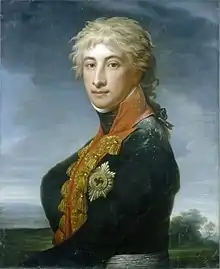Prince Louis Ferdinand of Prussia (1772–1806)
Prince Louis Ferdinand of Prussia (Friedrich Ludwig Christian; 18 November 1772 – 10 October 1806), was a Prussian prince and a soldier in the Napoleonic Wars.
| Prince Louis Ferdinand | |||||
|---|---|---|---|---|---|
 Louis Ferdinand Prince of Prussia (1772–1806), portrait by Jean-Laurent Mosnier, 1799 | |||||
| Born | 18 November 1772 Friedrichsfelde Palace, Berlin | ||||
| Died | 10 October 1806 (aged 33) Battle of Saalfeld | ||||
| |||||
| House | House of Hohenzollern | ||||
| Father | Prince August Ferdinand of Prussia | ||||
| Mother | Elisabeth Louise of Brandenburg-Schwedt | ||||
| Prussian Royalty |
| House of Hohenzollern |
|---|
 |
| Descendants of Frederick William I |
|
Louis Ferdinand was born in Friedrichsfelde Palace near Berlin. He was a son of Prince August Ferdinand of Prussia and Elisabeth Louise of Brandenburg-Schwedt, and was a nephew of King Frederick the Great. Ludwig von Wildenbruch was the elder of two illegitimate children of Louis Ferdinand by Henriette Fromme. The 1927 German film Prinz Louis Ferdinand was a biopic of his life.
Military career

Louis Ferdinand participated in the French Revolutionary Wars and was wounded during the Siege of Mainz. In 1806, he was one of the principal advocates of resuming the war against Napoleon and the First French Empire, triggering the War of the Fourth Coalition.
He died during the opening engagement of the war, at the Battle of Saalfeld. Louis Ferdinand was in command of 8,300 men when he advanced against marshall Jean Lannes' V Corps as they attempted to break out from the passes of Thuringian Forest. In that battle, he engaged a much larger French force (12,800 men), led by Lannes himself. The French held the high ground, while the Prussians had the Saale River behind their backs, which would make a retreat difficult. When he saw his forces beginning to rout, Louis Ferdinand charged the French cavalry. He was killed in combat by Jean-Baptiste Guindey, quartermaster of the French 10th Hussars, after Louis Ferdinand refused an offer to surrender and wounded the French NCO.[1] As a prominent leader of the Prussian court, his death was deeply felt.
Musical activities
Apart from being a soldier, Louis Ferdinand was also a gifted musician and composer. Johann Friedrich Reichardt, Kapellmeister to Frederick II and Frederick William II, considered him a great pianist. Early on Louis Ferdinand also started to compose music but he was not recognized for his compositional activities until later. His early pieces were performed by the orchestra of Prince Henry, the brother of Fredrick the Great. Later on, Prince Louis Ferdinand joined several salons in Berlin, where he frequently improvised on the piano. Among his circle of acquaintances were figures such as Schlegel, Wackenroder, and Tieck, all of whom were highly interested in music as well. Ludwig van Beethoven dedicated his Third Piano Concerto to him, a sign of high esteem for his piano playing.[2] Anton Reicha's massive variation cycle, L'art de varier, was also written for Louis Ferdinand.
In 1842, Franz Liszt wrote an Élégie sur des motifs du Prince Louis Ferdinand de Prusse, S. 168, for piano solo.
Musical works
The following is a complete list of compositions by Prince Louis Ferdinand with opus numbers:[3]
- Opus 1: Piano Quintet in C minor (published 1803)
- Opus 2: Piano Trio No. 1 in A-flat major (published 1806)
- Opus 3: Piano Trio No. 2 in E-flat major (published 1806)
- Opus 4: Andante with Variations in B-flat major for piano quartet (published 1806)
- Opus 5: Piano Quartet No. 1 in E-flat major (published 1806)
- Opus 6: Piano Quartet No. 2 in F minor (published 1806)
- Opus 7: Fugue in G minor for piano (published 1807)
- Opus 8: Nocturne in F major for flute, 2 horns and piano quartet (published 1808)
- Opus 9: Rondo No. 1 in B-flat major for piano and orchestra (published 1808)
- Opus 10: Piano Trio No. 3 in E-flat major (published 1806)
- Opus 11: Larghetto with Variations in G major for piano quintet (published 1806)
- Opus 12: Octet in F minor for clarinet, 2 horns, 2 violins, 2 cellos and piano (published 1808)
- Opus 13: Rondo No. 2 in E-flat major for piano and orchestra (published 1823)
Ancestry
References
- Andre Castelot: Napoleon.
- See Barbara H. McMurtry: Louis Ferdinand, Prince of Prussia. Grove Music Online ed. L. Macy (Accessed 2 August 2007).
- H. Kretzschmar: Louis Ferdinand, Prinz von Preussen: Musikalische Werke. Leipzig, 1910.
- Genealogie ascendante jusqu'au quatrieme degre inclusivement de tous les Rois et Princes de maisons souveraines de l'Europe actuellement vivans [Genealogy up to the fourth degree inclusive of all the Kings and Princes of sovereign houses of Europe currently living] (in French). Bourdeaux: Frederic Guillaume Birnstiel. 1768. p. 19.
- B. Nadolny: Louis Ferdinand. Düsseldorf, 1967
- E. Klessmann: Louis Ferdinand von Preussen, 1772–1806. Munich, 1972
- B.H. McMurtry: The Music of Prince Louis Ferdinand. diss., University of Illinois, 1972
- N. Miller: "Ein höchst poetische Natur...": Prinz Louis Ferdinand und der Klassizismus in der preussischen Musik, Mendelssohn-Studien, v (1982): 79–98
External links
| Wikimedia Commons has media related to Prince Louis Ferdinand of Prussia (1772–1806). |
- Free scores by Prince Louis Ferdinand of Prussia at the International Music Score Library Project (IMSLP)
- Genealogy of the Royal Family of Prussia at the Wayback Machine (archived October 28, 2009)
- https://web.archive.org/web/20060218033530/http://www.fortunecity.com/victorian/riley/787/Napoleon/Prussia/Commanders/Princelouis.html